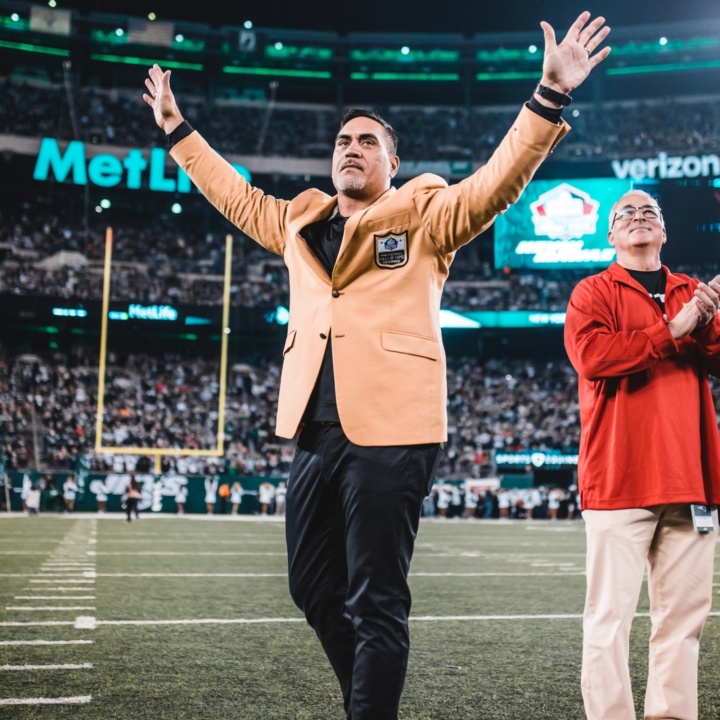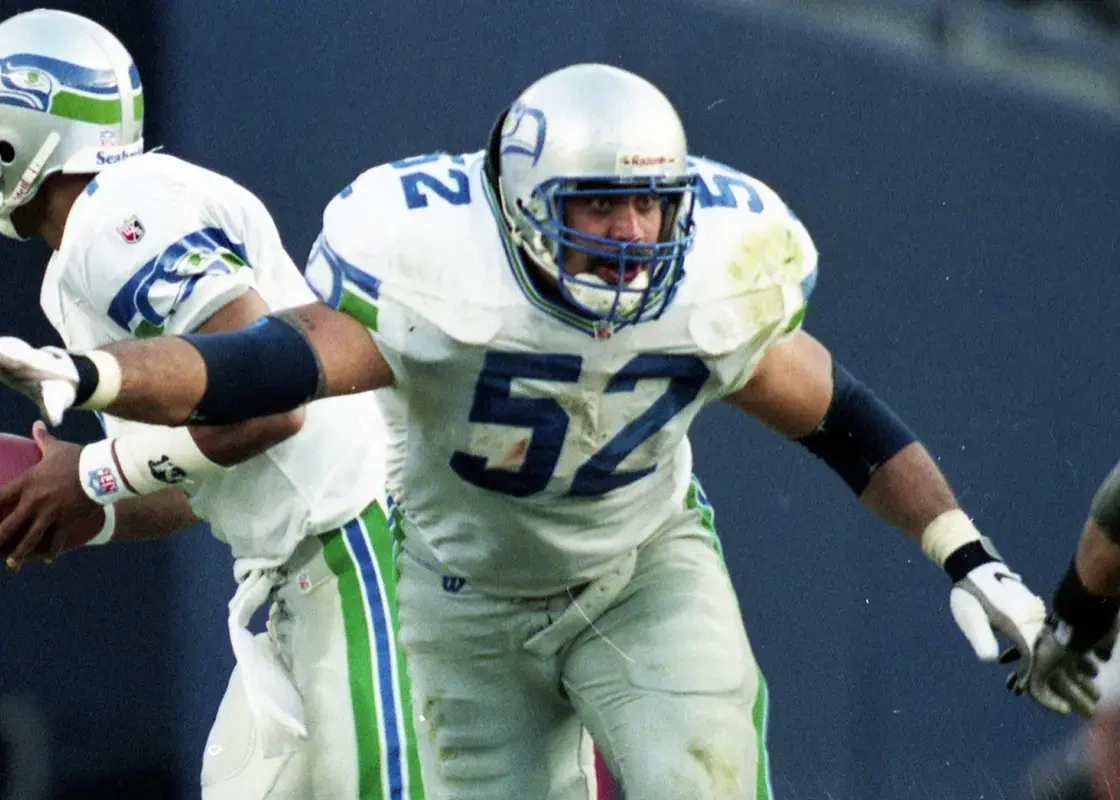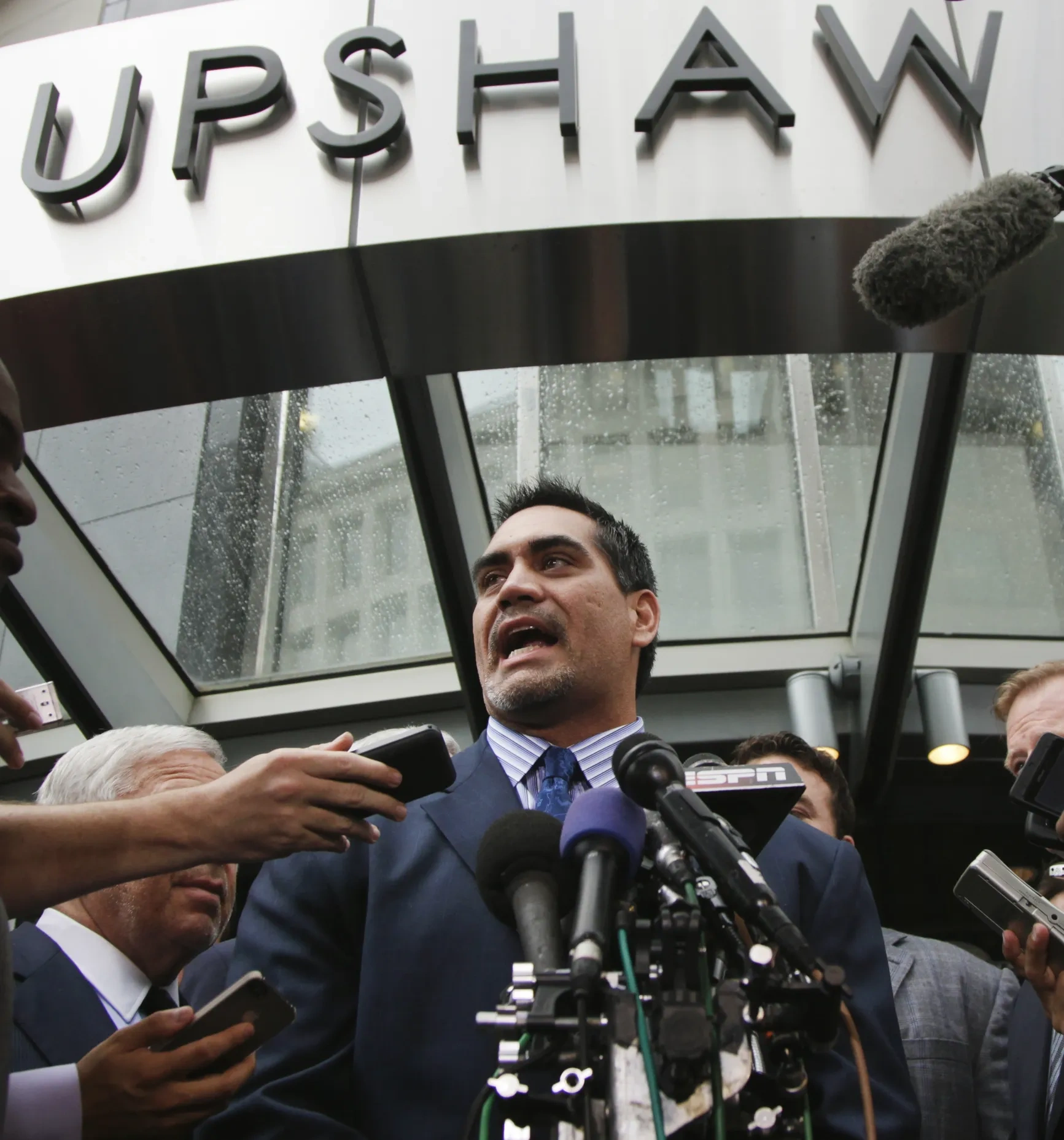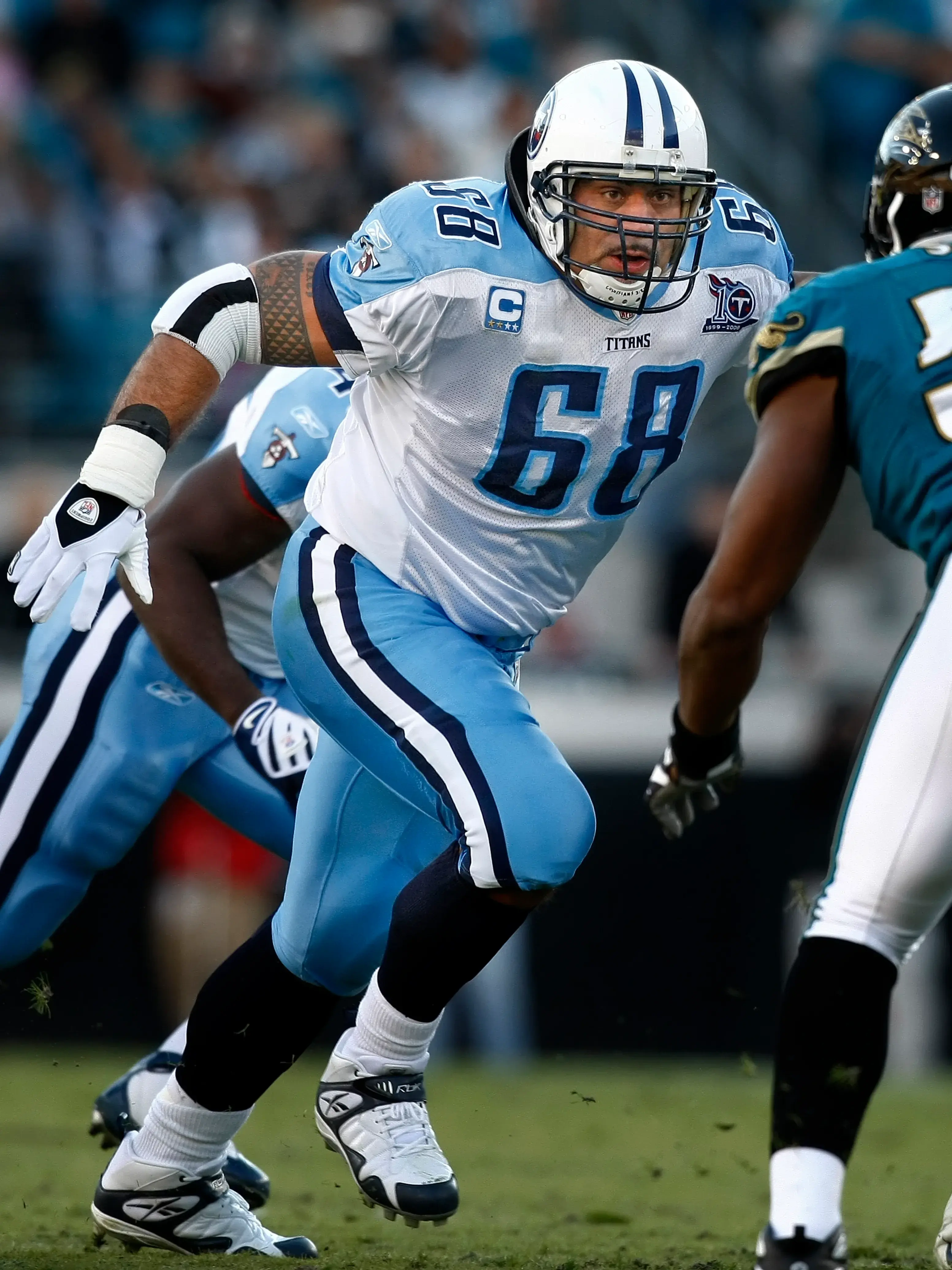
Catching Up With Former Player Rep: Kevin Mawae
Kevin Mawae is a 16-year NFL veteran, former NFLPA Player Rep, and former NFLPA President. A second-round selection in the 1994 draft from LSU, Mawae had an extremely impactful career both on and off the field as he earned accolades such as 8x Pro Bowl player, 3x first-team All-Pro player, 4x second-team All-Pro player, PFWA All-Rookie Team, New York Jets Ring of Honor, NFL 2000s All-Decade Team, and Pro Football Hall of Famer. We sat down with the legendary Kevin Mawae and learned more about his life during and after football.

What inspired you to become a Player Representative?
I don't know if it was inspired or expected, it was one or the other. I became a Player Rep in my fifth season in the league. My first four years I was with Seattle, then I was a free agent. I was with the New York Jets in 1998, and I was sitting in the meetings, the team meetings with the regionals, and stuff like that. I had a teammate sitting in front of me. They kept asking questions, and I kept having answers. He goes, “You need to be our Player Rep,” and I was like, “you need to nominate me,” because it was an election year. So, he did nominate me, and I got elected as the Rep. My first four years in the NFL I would go to the meetings and I would pay attention, but I never really got involved. I always had an inquisitive mind, and I wanted to understand the business of the NFL. So, when I was offered the opportunity to be a Player Rep, I took it. I became the Player Rep for the New York Jets in the spring of 1999.
With the experience of being a Player Rep, what made you want to go further and have a leadership role with the NFLPA?
Our president at the time was Trace Armstrong and Robert Smith was on the executive board. Several other older players did a great job during that time period of identifying younger Player Reps that they thought showed the ability to be leaders amongst the bigger group of Player Reps. So, they hand-picked about 5 to 8 of us and would invite us to the executive committee meetings that they would have throughout the year. Just to “see how we do things” and “understand how the executive committee works" and things like that. Being a part of that group piqued your interest a little bit, and I think it was after three or four years of being a Player Rep, there were elections where older players and retired players were cycling out during an election year. I got nominated at the board of representative meetings and got elected as a Vice President. For me, it was a natural ascension. I wanted to be a part of something bigger than myself, and there's no greater way than to serve the players in the NFL by being on the Board of Player Reps and being one of the Executive Committee members. So, one thing led to another, and I served on the Executive Committee for several years, and then going into the 1998 season, I got elected as President of the NFLPA. I served in that term for four years.
What lessons and experiences did you take away from being the NFLPA president, and part of the executive committee?
I learned that when you're the leader among everybody, you're not going to please everybody. There's always going to be a group of people that never wanted you, never liked you, and don't want to hear what you have to say. There's going to be another group that's apathetic, that doesn't care one way or another. Both of those sides are very small groups of people. So, you always have to focus on the fact that you represent the majority and you're never going to get a consensus. I think one thing that Gene Upshaw used to always say is, “The minority will always be heard, but the majority is always going to rule.” And so, understanding that and understanding how that works, whatever the issue was, whether it be a resolution for a new program, a new rule put in place, a negotiating tactic, or a bargaining chip, you have to think about the decision you are going to make that would be the best for the majority of the players. Also, ultimately making those decisions knowing that you may never be affected by them, because being an older player at that time, you're trying to leave the game better than you found it. Knowing that those decisions that you're making are going to affect those who come after you and not necessarily affect you individually at that moment.

Why do you think more players should be involved or be active with the NFLPA?
I think if you're in any profession, you need to know what that profession is all about, and you need to be in tune with the business of whatever it is you're taking part in. For professional football players, you need to understand the business of football. A lot of guys play the game and have the “it’s all I ever want to do” kind of mentality, but there's big business behind all of it. You're just another part of the puzzle for a bigger entity than just yourself. Understanding how negotiating works, how your contracts work, how the rules that are put in place came to be, and how that affects how you change things for the guys that come after you is all vitally important. It's not just good enough for you to come in and be a pro player, but truly be a professional and understand every aspect of your job. That includes in the off-season, dealing with the collective bargaining agreement, knowing what's in the rules and what the “dos” and “don'ts” are, and stuff like that. When you have a full understanding of that, then it actually makes you a better player. It makes you a better leader in the locker room, and it makes you a better leader in general.
What is one piece of advice that you have for players that are transitioning out of the NFL?
Well, I think understanding who you are outside the game of football. Really put some time and thought into who you would want to be if you never had the game of football in your life. I think too many times guys transition out and they've never considered what was next, or considered what they would have been doing had they not gotten into football. So, when you have that in mind, you start understanding that the transition doesn't take place the day you retire, it starts taking place the day you come into the NFL. It is a stepping stone, and it provides the resources that you need so that you can be whatever it is that you want to be outside of being a football player. I think a lot of the time our players don't really have that mentality. They think that they're going to play, or that everybody's going to play until they're 39-40 years old. We all know statistics show that 95% of guys won't make it past year three in the NFL, and they will have to move on. Fortunately for me, I played for a long time. I played for 16 seasons. By the time I got to the end, I had already gone to graduate school and got my master's degree, and I knew who I was outside the game. I was a husband, I was a father, and a lot of that is just growing up in the game, knowing the business of the game, the statistics, the bad and the good of the statistics. Also, there's a spiritual part to my life that allowed me to know who I was as a person, and as a man, with or without football. A lot of guys don't have that. I would encourage guys to explore their spiritual side to find those answers outside the game of football. So, for me, the transition was relatively easy. I was an older player. My contract was up. I knew I could play some more, but that didn't happen. I believe God does things and allows certain guys to do different things. It was just a new season of life for me to move into. I transitioned slowly. I went into coaching immediately after as an intern coach at Vanderbilt University, and then I coached high school football for a year. I then made a conscious decision to just be still and get away from the game altogether for a year or so before I started exploring what the next opportunities were. I think that more guys should explore themselves outside the game, and what they really want to be for the next 50 years. Then, during those 5 to 10 years that they're in the game, they can set themselves up for what’s next.
So, what are you doing in your career now?
Now, I am retired. I am currently sitting on my couch looking at the lake thinking about how awesome it is that the NFL afforded me this life. I retired in 2009, and over the course of 14 years, I became a full-time dad, where I took my kids to every swim meet, every school event, and everything that they had going on. Then, I transitioned into trying to get into coaching. It was a 10-to-11-year journey. I coached junior high football and high school football, and I actually was an assistant coach for the Colts for two seasons. I was the head coach most recently, last year at a high school. After that I was like, I'm done. I've given everything I want to the game. So, my wife and I moved back to Louisiana, close to our family in Louisiana. I enjoy being an uncle and a parent, being a child to aging parents, and being available to the rest of my family. My kids are somewhat grown, they're in their mid-twenties, so I also enjoy being available to them. Also, I do a side deal. I'm one of the appeals hearing officers jointly appointed by the NFL and the NFLPA. I hear the appeals of players who get fined for on-field infractions. That keeps me tied to the game without having to be completely 100% engrossed in the game. I don't feel like I need to be tied to TV, or anything like that. I do it from the luxury of my own home and it still keeps me involved. I speak to the legal staff and the NFLPA on a regular basis, so I'm involved, but not engrossed. I do that, and I just enjoy spending time with my wife and my kids. My kids live in Hawaii, so I travel there as much as I possibly can. And, like I said, I take care of my aging parents, and I have the blessing of being around them as they get into old age.

What lessons did you learn from playing football, and how do you think that those applied to your post-playing career?
I think that the lessons I learned from football just reiterate the lessons that I learned growing up. One is to always give your best effort. If it's worth doing, do it right the first time. That's something my dad taught me a long time ago. That's the kind of effort I gave while I was playing and it's the effort I gave in everything else I did. Two is that loyalty is valuable. It's like gold. I value people who are loyal to me. If I'm working for somebody, I'm loyal to them. I'm still loyal to the NFLPA because I spent a lot of years, sweat, anxiety, tears, and frustration, helping to build what the NFLPA is now. That boils down to legacy. It's about leaving a legacy and knowing that you left the game better than you found it. I think that's important to me because there are always younger guys who will say, “Hey, I heard this about you,” or “I read this about you when you were the PA President,” or even as a player, but leaving a legacy matters. I don't know if that’s a lesson, but it's something that you should strive for. Learning how to hear everybody's argument, but making the right decisions for everybody, and at the end of the day standing by your convictions. I played the game that way, and I led it that way. I might not agree with you, but I will respect you and hear you. But, if I'm convinced that this is the way it's got to go then, that's what I'm going to do. When you live by your convictions, and what you truly believe in, just be yourself in doing it. Then, you'll find yourself in a position that you never imagined possible.
What is one piece of advice that you wish you had when you started your NFL career?
Understand the business of the game as early as possible. It took me four years to really dive into it. I was on a week-and-a-half holdout going into my rookie year in Seattle. That kind of woke me up a little bit, to really understand the business of the game, where the money comes from, how it's derived, and what part you play in that. It’s one thing to understand the business, but to also understand your rights, and know your rights. Whether it be a second opinion, understanding the off-season conditioning rules, trade rules, what happens if you get traded, stuff like that. A lot of guys don't really pay attention to it until it happens to them. Then they're frustrated because they didn't know. I think it's a poor excuse for me to say you didn't know this was possible only because you didn't take the time to understand the business of the game. So, those are the things I would tell younger guys. Then the other part of it is just on the personal side; learn how to say no. For a football player who's coming into a lot of money, the salary cap is 100 plus times what it was when I was playing or it's like 300% more than what it was. The salary cap was 30 million when I got there, and now it's up to 130 million, and a lot of people want to be a part of it. The more you learn how to say no, the happier you're going to be. That's a tough thing for a lot of people. It's tough for me. It's tough for a lot of guys to come into a situation like that. I think at the end of the day, just play the game, and play the game because you love the game. If you're playing for money, you're going to be miserable the whole time.
What does the NFLPA fraternity mean to you?
Oh, man, what does the NFLPA fraternity mean to me? It means brotherhood. It means we are a very select few group of men who got to do something that millions of people wish they could do. So, do not take that lightly, and understand that there are very few of us who got to walk in the shoes that we did. At the end of the day, it boils down to brotherhood, honor, and respecting one another.